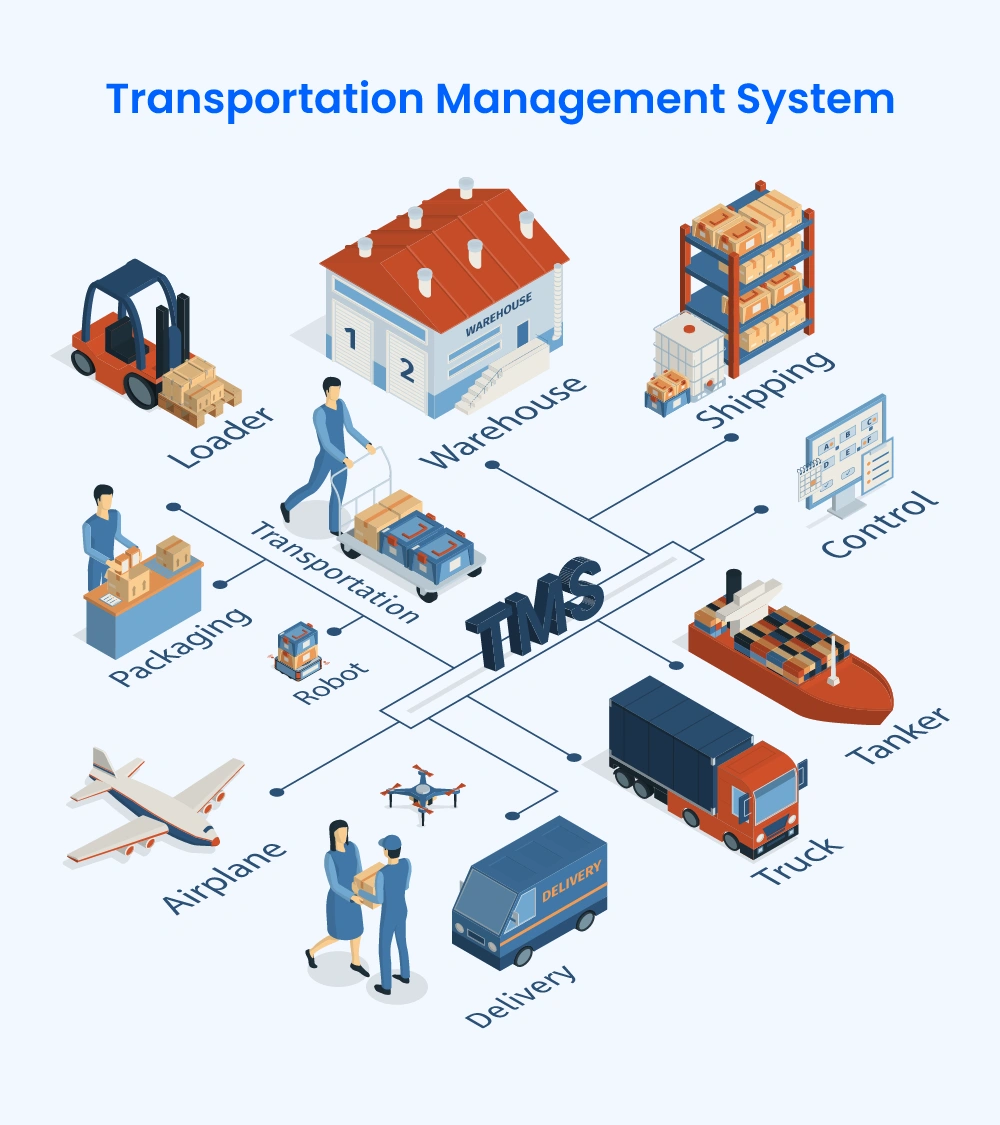Fast & Accurate ENS GB & EU ICS2 Solutions Built for You.
Transportation Management System - TMS : Optimise Freight Costs
-
Freya Jane
- Director of Customer's Success
Customs traders, do you need help controlling freight costs? One of the biggest logistics challenges is controlling supply chain expenses while ensuring smooth operations. You’re not alone in wondering this—freight management’s intricacies often stump businesses. Transportation Management System (TMS) integration is the solution.
TMS integration, customs merchants’ challenges, and how iCustoms integrates with TMS to solve them are covered in this article. Join us as we discuss how TMS integration may transform freight management, helping you overcome difficulties, optimise costs, and stay competitive in the growing customs market.
What is TMS?
Transportation management system (TMS) is software that facilitates enterprises’ planning, optimisation, and management of freight and cargo transportation.
The transport management system allows businesses to operate their trade compliance and ensures reduced time, cost, and global tracking of shipments. It further eliminates the hectic paperwork of freight billing and compliance documentation.
It plays a pivotal role across various sectors due to its integral role within logistics, an indispensable component of virtually every business realm. The question often arises as to who can effectively leverage TMS.
Who can benefit from transportation management systems?
- Supply Chain Administrators: TMS helps with goods transportation planning and optimisation.
- Directors of Transportation: Offers information for timely and economical delivery.
- Producers and Shippers: Assists in planning and executing efficient transportation.
- Logistics Companies: Offers visibility into goods movement and contract compliance.
- Trucking Firms and Carriers: Optimise routes and enhances overall transportation efficiency.
- Retailers: Ensures timely and cost-effective delivery to stores or consumers.
- Wholesalers: Streamlines movement from manufacturers to retailers.
- Import/Export Brokers: Manages cross-border complexities and ensures compliance.
- Logistics Experts: Centralised platform for efficient transportation management.

Features of Transportation Management System (TMS)
Logistics and transport administration:
The central objective of a freight and customs management system revolves around precise transportation planning and execution. Transportation Management System software stands out for its proficiency in providing streamlined trade routes and precise cargo arrival and departure forecasts. This enables businesses to oversee and optimise their supply chain operations effectively.
Tracking of shipments:
The Transportation Management System allows users to monitor shipments on an ongoing basis. This critical feature lets users track shipments, predict delays, and give consumers accurate delivery updates. TMS also uses alert and notification functions to report key transportation occurrences.
Reporting and analysis:
The logistics management system generates many reports and provides advanced analytical tools to evaluate transportation operations. KPIs, budgets, and new developments can all be analysed by the users. This information-based understanding gives businesses the upper hand in decision-making, allowing them to zero in on problem areas efficiently and cut expenses.
Optimal pathfinding:
Transportation software users can plan and optimise the most effective shipping routes. Distance, traffic, delivery times, and truck capacity are important factors. This complete method reduces transportation costs and boosts delivery efficiency for cost-effective logistics operations.
Cloud-based and integrated logistics management digital system
Today’s businesses need fast file access and an easy-to-use management system. So, both small and large businesses can use fleet management software. Furthermore, TMS is available in both cloud-based software and digital formats, offering flexibility to users according to their preferences and convenience.
How does the TMS manage the customs freight movement?
The Transportation Management System improves and streamlines transportation processes to help manage the flow of customs goods. TMS is part of the Supply Chain Management (SCM) ecosystem and commonly interacts with Warehouse Management Systems (WMS) to transfer items across borders efficiently and legally.
Its primary focus is on planning, executing, and monitoring commodity transportation. The transportation management system centralises customs freight data like product descriptions, sources, destinations, and customs restrictions. TMS automates document generation for customs clearance, ensuring accuracy and reducing delays.
TMS, SCM, ERP and WMS must work together for smooth operations. SCM manages commodities from suppliers to clients, and TMS streamlines transportation. To enable smooth commodity transfer from warehouses to transportation carriers, TMS connects with WMS, optimising warehouse operations.
Synchronisation reduces transit times and optimises inventory. TMS also gives SCM experts visibility into the transportation segment, helping them make decisions, respond to disruptions, and improve supply chain performance. In conclusion, TMS integrates customs freight movement into the SCM and WMS environments, improving logistical efficiency, compliance, and cost savings.
Does TMS improve customs declaration?
A transportation management system might improve customs declaration processes, although customs brokers and traders may face obstacles while implementing TMS. These problems become serious hurdles for customs traders and brokers.
1. Complexity of Regulations:
The customs policies of different nations differ significantly. Adjusting TMS to meet a wide range of rules can be time-consuming and challenging.
2. Integration of Data:
Significant work may be involved in integrating TMS with preexisting databases and customs software to guarantee data correctness and consistency.
3. Customisation:
Additional development and testing may be required for TMS customisation to suit local customs regulations. However, this creates a gap, and the customs officials need help to fulfil TMS requirements.

iCustoms integration with TMS (Transport Management System)
In the preceding section, we explored customs dealers’ common challenges when utilising Transportation Management Systems (TMS) for international trade operations. These difficulties prompted customs officers to seek a solution to bridge the gap between logistics software and comprehensive Customs Declaration Software (CDS), ultimately enhancing operational efficiency.
In response to these challenges, iCustoms has introduced an innovative AI-based solution for intelligent customs management. This solution simplifies trade compliance and enhances accessibility for business owners. It is user-friendly and seamlessly integrates with transportation software.
iCustoms iHub is a vital link within the supply chain, connecting various components such as warehouse management, transport management, and SCM. This collaboration is facilitated through a structured pattern where iHub acts as a connector, allowing supply chain components to connect via APIs to regulate the CDS.
Speaking specifically about TMS, iCustoms offers the iNCTS service, which effectively manages freight movement and provides customs brokers and traders with proactive monitoring for enhanced visibility. TMS is diverse and complex, so iCustoms integrates seamlessly with TMS operations to simplify trader operations and ensure adequate checks and balances.
All communications are consolidated into a single platform, facilitating efficient shipments, enabling precise tracking, reducing cost, and optimising route structuring. This comprehensive approach enhances the effectiveness of cross-border trade operations.
Conclusion
In a nutshell, the correlation of Transportation Management Systems with iCustoms delivers a solution that completely transforms the landscape for companies that deal with customs. To thrive in today’s cutthroat market, essential issues that must be taken into consideration include the simplification of customs procedures, the reduction of associated costs, and the enhancement of freight management.
Recognising iCustoms as a crucial facilitator when delving into TMS integration is necessary because it will elevate your operational efficiency and guarantee compliance. Take advantage of this powerful relationship to bring the full potential of your supply chain to accomplishment.
Switch to iCustoms today and empower your business to accelerate its progress and pursue new advancements in the world of trade!
FAQ's
What is TMS optimisation?
TMS optimisation makes it easier for businesses or logistics service providers to manage transport information with a Transport Management System (TMS), increasing efficiency.
What is an SAP transportation management system?
SAP Transportation Management (SAP TM) is an end-to-end software system for managing logistics and transportation processes. It improves transportation operations planning, carrying out, and monitoring. Some key features are collaboration between carriers, goods order management, analytics, event management, real-time visibility, and smooth connection with other SAP modules.
What are the benefits of TMS in SAP?
The following are the benefits of TMS in SAP
- Real-time Visibility
- Efficient Planning
- Carrier Collaboration
- Cost Savings
- Streamlined Freight Management
- Proactive Issue Resolution
- Global Compliance
- Data-driven Optimisation
- SAP Integration
Who uses transportation management systems?
- Supply Chain Administrators
- Directors of Transportation
- Logistics Providers
- Producers and Shippers
- Logistics Companies
- Trucking Firms and Carriers
- Retailers
- Wholesalers
- Import/Export Brokers
- Logistics Experts
You may also like:
Automate Your
Customs Process
Reduce Paperwork, Improve Accuracy & Enhance Customs Compliance
Subscribe to our Newsletter
About iCustoms
Automate Your
Customs Process
Reduce Paperwork, Improve Accuracy & Enhance Customs Compliance
